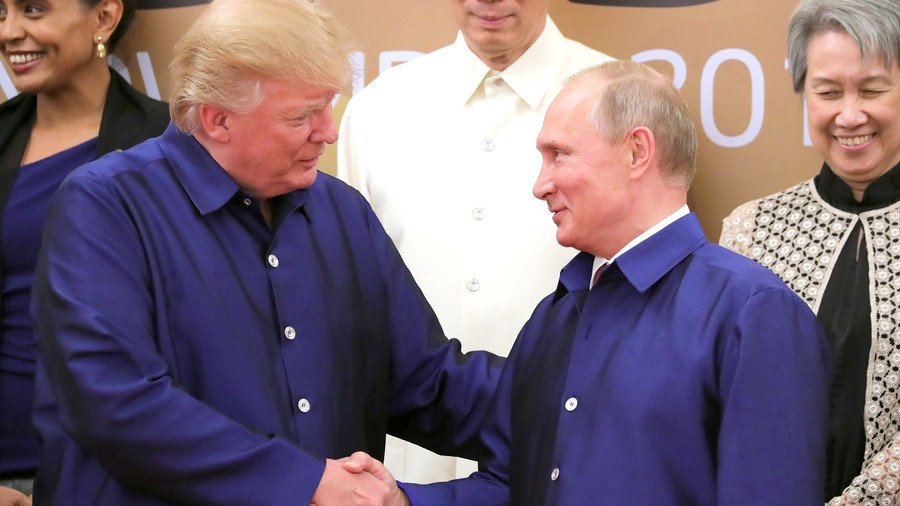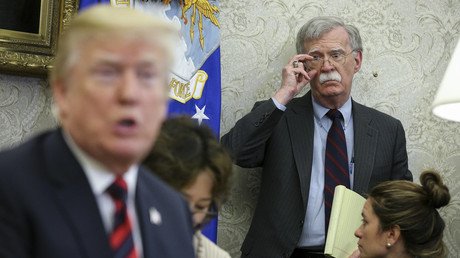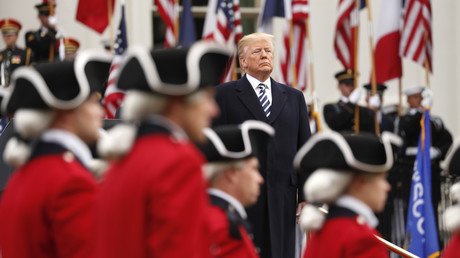US establishment in hysterics that Trump-Putin summit might succeed

There are many reasons the bipartisan US establishment hates Trump. His heresies from neoliberal orthodoxies on immigration and trade are prominent. But top among them is his oft-stated intention to improve relations with Russia.
That’s fighting words for the Deep State and its mainstream media arm, for which demonizing Russia and its president Vladimir Putin is an obsession.
The fact that Donald Trump made his intention to get along with Moscow a priority during his 2016 campaign, both against his Republican primary rivals and Hillary Clinton (who has compared Putin to Hitler) was cause for alarm. This is because far more than even the frightening prospect that the 70-year state of war on the Korean Peninsula might end, US reconciliation with Russia would yank the rug out from under the phony justifications for spending hundreds of billions of dollars annually to counter a “threat” that ceased to exist over a quarter century ago. Absent hostility to Russia that money has no reason to keep sustaining the power, privilege, and prosperity of a horde of moochers and profiteers, both at home and abroad.
That’s why when it was reported soon after his January 2017 inauguration that Trump was seeking to open dialogue with the Kremlin and set an early summit with Putin there was a hysterical counteraction. As described just over a year ago by conservative columnist and former presidential candidate Patrick Buchanan:
“Trump planned a swift lifting of sanctions on Russia after inauguration and a summit meeting with Vladimir Putin to prevent a second Cold War. The State Department was tasked with working out the details. Instead, says Daniel Fried, the coordinator for sanctions policy, he received ‘panicky’ calls of ‘Please, my God, can you stop this?’. Operatives at State, disloyal to the president and hostile to the Russia policy on which he had been elected, collaborated with elements in Congress to sabotage any detente. They succeeded. “It would have been a win-win for Moscow,” said Tom Malinowski of State, who boasted last week of his role in blocking a rapprochement with Russia. State employees sabotaged one of the principal policies for which Americans had voted, and they substituted their own.
Back then, constitutional government and the rule of law took a back seat to bureaucratic obstructionism, atop months of a phony “Russian collusion” story that even anti-Russian Republican Congressmen are now calling to “finish the hell up.” But now, in the aftermath of the successful Singapore summit and with the collusion narrative looking ever more threadbare, Trump is back on track. The summit with Putin will finally take place on July 16 in Helsinki, Finland, the site of earlier meetings between American and Russian leaders.
Today the assaults on Trump are no less frenzied than a year ago, but they seem to pack less of a punch with the critics’ glum awareness that, aside from some extraordinary provocation, little can be done to stop the summit from taking place. The Beltway Swamp’s flagship bulletin board Washington Post accused Trump of “kowtowing” to Putin by merely agreeing to meet with him. Trump’s one-on-one with the “autocrat” Putin will be a “meeting of kindred spirits,” warned the conceited New York Times. Putin has “devoured” Trump grumbled über-Russophobe Ralph Peters on CNN. Trump wants to “Finlandize” the US moaned Max Boot. Officials in the United Kingdom, a key culprit in ginning up “Russiagate” in the first place, are particularly scared that – horror! – there could be a “peace deal” between Trump and Putin.
Major worries are voiced by useless freeloader countries we call“allies,” whose governments fret that the US will become “less reliable” – to their rulers’ interests of course, not to those of the American people. This specifically means the members of NATO, whose summit Trump will attend prior to Helsinki. As former US ambassador to Moscow and to NATO Alexander Vershbow suggests, “allies are wondering whether they will be in for nothing more than a tongue lashing by President Trump over insufficient defense spending, further inflaming transatlantic divisions over trade, the Iran deal, and other issues.”
Given the unprecedentedly perilous nature of US-Russian relations today, a Trump-Putin summit is imperative (Op-Ed by Stephen Cohen) https://t.co/4WBBBY80Jo
— RT (@RT_com) June 29, 2018
Indeed, Trump’s hammering on the NATO deadbeats’ treating the US as a “piggy bank” that will no longer be at their disposal exposes the biggest fraud at the heart of the long-obsolete alliance: there is no threat of Russian military “aggression” and they all know it. If these countries really thought they were in danger of invasion from Russia (and not from Third World migrants, regarding which NATO is totally worthless) they wouldn’t need Trump to nag them about spending, they’d commit more money because they knew they had to. The proof is in noting which NATO member, after the US, consistently spends the largest GDP share on its military: Greece. Is that because the penniless Greeks are terrified of Russia? No, they’re afraid of a genuine threat from their fellow NATO “ally,”Turkey.
In the absence of an actual military menace from the east, NATO advocates are scrambling to come up with ever more imaginative justifications. As described by one member of Latvia’s parliament on the website of the Atlantic Council, a leading Washington establishment think tank, the real Russian threat comes from “hybrid warfare, with an increased focus on asymmetric and nontraditional military capabilities, has made it considerably more difficult for NATO to counter destabilization efforts, information operations, cyber-attacks, disinformation, propaganda, and psychological operations.” Yeah sure, maybe Trump will fall for that! Anything to save the Atlantic Council’s $30 million budget provided by a Who’s Who of US government agencies, NATO and Gulf Arab governments, and military contractor firms.
However, it should not be thought that the US and NATO establishment’s hostility to Russia is entirely venal. There is also a strong ideological component. Whereas during the first Cold War much of the western establishment, especially on the Left, felt an affinity for the materialist goals of communism (if not its methods), Russia’s reemergence under Putin as a conservative country in which national traditions and the Orthodox Church are respected has led to a bitter sense of betrayal. That makes Putin, as articulated by Hillary Clinton, leader of the worldwide “authoritarian, white-supremacist, and xenophobic movement” who is “emboldening right-wing nationalists, separatists, racists, and even neo-Nazis.” No Soviet leader, not even Joseph Stalin, was ever portrayed in such diabolical fashion in US media and government circles the way Putin is.
It is no coincidence that Trump himself is vilified in the same dire Hitlerian terms once reserved for foreign targets of regime change like Slobodan Milosevic, Saddam Hussein, and Muammar Gaddafi. Together with the rising elements of anti-establishmentism in Europe, most recently in the installation of a patriotic Lega/Five-Star government in Rome, the post-modern, neo-liberal elite on both sides of the Atlantic feels its dominance slipping away.
For some Democratic partisans and Never-Trump neo-conservative Republicans, horror at improved US-Russia relations competes with the loathing of Trump personally. But for other Americans, both supporters of the President and people who find him objectionable, the summit should not be seen as a litmus test about their attitudes toward the current occupant of the White House. Rather, the issue is what the summit can mean for Americans’ safety and security – and perhaps our very survival.
Claims of Russian collusion and attitudes toward Trump have obscured the fact that Russia is the only country on the planet with a nuclear establishment on a par with ours. Even during the worst periods of the first Cold War with the USSR, US administrations of both parties kept in mind that a minimum of mutual respect and open communication was not just prudent, it was literally a matter of life and death – for the American people and for the world.
During the past few years as we have entered what has been called a second Cold War, this time with post-communist Russia, the seriousness with which the US used to regard the old Soviet Union has been lacking. The bipartisan foreign policy consensus became a closed, incestuous loop in which Republicans and Democrats vied for who could be most strident in their anti-Russian attitudes: let’s poke the bear and see if he growls!
NATO expansion right in Russia’s face became an end in itself, continuing with induction of Montenegro in 2017, plans to welcome Macedonia (or “North Macedonia” or whatever other silly name is concocted to appease Hellenic pride) – even Ukraine, Georgia, and Bosnia-Herzegovina remain formally on track for joining.
READ MORE: Putin-Trump meeting set for July 16 in Helsinki, Kremlin confirms
Color revolutions and disastrous wars of regime change toppled Moscow-friendly governments, justified as supposed “democracy promotion.” Risk of confrontation between US and Russian military personnel – studiously avoided during Cold War 1 – takes place with reckless glee in Russia’s Black and Baltic Seas littorals, in Ukraine, and especially in Syria, where earlier this year American forces reportedly slaughtered many Russian contractors – to the delight of some of those now warning darkly against the Trump-Putin meeting. Perhaps most dangerously, the painfully constructed complex of arms control agreements has atrophied as both sides build up stocks of new hypersonic, cyber, and space weapons.
It is perhaps beyond the power of either Trump or Putin to reverse this dangerous trend with one stroke, but maybe they can at least make a start in arresting it. The usual suspects warn of failure, but their real worry is that the summit might be a success. Let’s hope their worst nightmare comes true and peace breaks out.
Jim Jatras, former US diplomat
Think your friends would be interested? Share this story!
The statements, views and opinions expressed in this column are solely those of the author and do not necessarily represent those of RT.

















